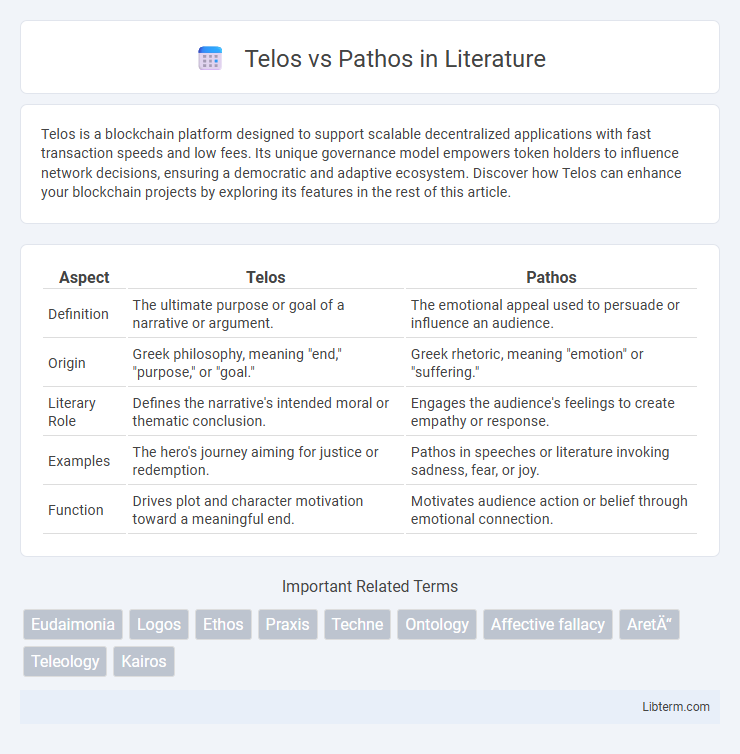Telos is a blockchain platform designed to support scalable decentralized applications with fast transaction speeds and low fees. Its unique governance model empowers token holders to influence network decisions, ensuring a democratic and adaptive ecosystem. Discover how Telos can enhance your blockchain projects by exploring its features in the rest of this article.
Table of Comparison
| Aspect | Telos | Pathos |
|---|---|---|
| Definition | The ultimate purpose or goal of a narrative or argument. | The emotional appeal used to persuade or influence an audience. |
| Origin | Greek philosophy, meaning "end," "purpose," or "goal." | Greek rhetoric, meaning "emotion" or "suffering." |
| Literary Role | Defines the narrative's intended moral or thematic conclusion. | Engages the audience's feelings to create empathy or response. |
| Examples | The hero's journey aiming for justice or redemption. | Pathos in speeches or literature invoking sadness, fear, or joy. |
| Function | Drives plot and character motivation toward a meaningful end. | Motivates audience action or belief through emotional connection. |
Understanding Telos and Pathos: Core Definitions
Telos refers to the ultimate purpose or goal inherent in an object or action, emphasizing intention and end result in philosophical and rhetorical contexts. Pathos involves appealing to the audience's emotions to persuade or engage, often using evocative language and imagery. Understanding telos establishes the foundational objective, while pathos enhances communication by connecting emotionally with the audience.
Historical Origins of Telos and Pathos
Telos, rooted in Aristotelian philosophy, refers to the inherent purpose or ultimate goal of an object or action, establishing a foundation for teleological ethics and metaphysics. Pathos, also originating from Aristotle's rhetorical framework, denotes emotional appeal used to persuade an audience by evoking feelings such as pity, anger, or fear. The historical development of Telos centers on natural philosophy and final causes, while Pathos evolved primarily within rhetorical theory and persuasion techniques in ancient Greece.
Philosophical Foundations: Telos vs Pathos
Telos, rooted in Aristotelian philosophy, signifies the ultimate purpose or goal inherent in an object's or being's nature, representing the end toward which all actions and processes are directed. Pathos, also derived from Aristotle, refers to the emotional appeal or the experience of suffering and passion that influences human behavior and ethical decision-making. Understanding telos provides insight into intention and fulfillment, while pathos illuminates the role of emotions in shaping moral and rhetorical frameworks.
The Role of Telos in Argumentation
Telos in argumentation serves as the ultimate purpose or goal that guides the structure and intent of a discourse. It directs the speaker's reasoning toward achieving a specific outcome, ensuring that each claim and rhetorical strategy aligns with the overall objective. Understanding telos enhances persuasive effectiveness by clarifying the desired impact on the audience and framing arguments in a goal-oriented manner.
The Influence of Pathos in Persuasion
Pathos plays a crucial role in persuasion by appealing to the audience's emotions, thereby increasing engagement and making arguments more relatable. Emotional triggers such as fear, joy, or empathy can motivate individuals to act or change beliefs more effectively than pure logic. Marketers and speakers often leverage pathos to create memorable and compelling messages that resonate deeply with their target audience.
Comparing Logical Purpose and Emotional Appeal
Telos centers on the logical purpose and inherent goal of communication, driving an argument toward its intended outcome or truth. Pathos appeals directly to the audience's emotions, crafting messages that evoke feelings such as empathy, anger, or excitement to influence perception. Comparing the two, Telos relies on reasoned objectives and evidence, whereas Pathos leverages emotional resonance to persuade effectively.
Telos in Rhetoric: Shaping Intent and Outcome
Telos in rhetoric refers to the ultimate purpose or goal behind a communication, guiding both the speaker's intent and the desired outcome. It shapes the structure and content of the message to align with persuasive objectives and audience response. Understanding telos enhances the effectiveness of rhetoric by ensuring that all elements contribute directly to achieving the intended impact.
Pathos in Communication: Evoking Audience Emotion
Pathos in communication strategically taps into audience emotions to foster connection and persuade effectively. Employing vivid storytelling, relatable anecdotes, and emotive language enhances audience engagement and influences decision-making. Understanding the psychological triggers behind pathos enables communicators to evoke empathy, passion, or urgency, making messages more memorable and impactful.
Balancing Telos and Pathos for Effective Storytelling
Balancing telos and pathos is essential for effective storytelling as it harmonizes purpose-driven narratives with emotional resonance. Telos grounds a story in clear goals and meaning, while pathos engages the audience's emotions, creating empathy and investment. Mastery of both elements enhances narrative impact, ensuring stories are memorable and persuasive.
Practical Applications: Telos vs Pathos Today
Telos emphasizes goal-oriented reasoning and is crucial in project management, strategic planning, and ethical decision-making where outcomes must align with ultimate purposes. Pathos plays a vital role in marketing, political campaigns, and leadership by appealing to emotions and enhancing engagement and persuasion. Combining Telos and Pathos enables businesses to create purpose-driven messages that resonate emotionally while driving actionable results.
Telos Infographic

 libterm.com
libterm.com